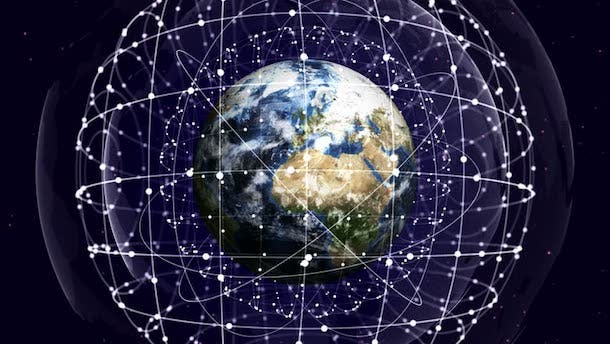It’s not often that you get together a world-leading philanthropist, a global business magnate, a Nobel prize winner, a former president, a Minister of the Future, a Forbes 30 under 30 entrepreneur, and a digital rights activist to share their thoughts about the future of new technologies.
But on June 10, such a group, bolstered by experts on digital rights and cryptocurrency and a civil society leader, came forward to share its ideas for how the world can navigate the age of digital interdependence.
The group – led by Melinda Gates and Jack Ma – was convened last year by the United Nations Secretary-General as part of a larger set of work he has undertaken around new technologies. The Secretary-General gave the group, known as the “High-level Panel on Digital Cooperation,” an ambitious task: He asked it to identify new proposals to strengthen digital cooperation, accelerate and broaden the benefits of digital technologies, and better manage their associated risks and challenges to ensure a safer and more inclusive future.
Members of the panel quickly deployed around the world to better understand how digital technologies are offering new opportunities and presenting new challenges and to seek views from governments, civil society, the private sector, academia, and rights groups on how the world can harness the very best that digital and technology advancements offer to ensure a safer and more inclusive world.
This week, Gates and Ma delivered the culmination of the panel’s work to the Secretary-General and the world. The report, the Age of Digital Interdependence, couldn’t be timelier. Every day, we are inundated with reminders that digital technologies offer unprecedented opportunities around the world: from enabling millions of women to access banking services through their phones to eliminating debilitating diseases to new potential climate solutions.
But they also hold the potential for almost unimaginable risks from rapidly widening automation-induced inequality to unstoppable lethal autonomous weapons systems. As technological advances accelerate, our ability to navigate these challenges has been completely outpaced.
So, what did the panel find across their global consultations?
First, the panel argues that urgent progress is needed to ensure meaningful inclusion in the digital world. Despite rapid progress over the last decade, still half of the world is not online, increasing their risk of being left behind in a world of widening inequality, both within and across countries. Any path toward achieving the Sustainable Development Goals by 2030 will require that we better harness technologies and ensure more equitable access, particularly for women and other marginalized groups.
Second, new technologies are quickly changing relationships between individuals and societies. They are connecting individuals around the world in new ways, but also sharpening divides. Digital technologies are presenting new challenges to our social, economic, and political systems that have meaningful implications for the day-to-day lives of people from New York to Nairobi to Sao Paulo to Shanghai.
Above all, the panel stresses that universal human rights that exist offline apply to the same measure in the digital realm, even if further work is needed to translate how.
Third, the panel found an urgent and growing need for a rethink on the web of interconnected mechanisms through which governments, civil society, technologists, and the private sector together manage digital cooperation. A patchwork of regulatory mechanisms, increased competition, and rapidly evolving security threats are preventing digital technologies from reaching their full potential to solve global challenges. At worst, they spell our doom through advanced autonomous weapons systems or hastily deployed artificial intelligence technologies. The stakes are simply too high.
To make meaningful progress, the panel offers three options to bolster current international cooperation on digital and technology issues:
- An enhanced and empowered Internet Governance Forum, an existing multistakeholder platform organized by the UN, to better reflect and incorporate the views of the private sector, civil society, and smaller countries that are typically underrepresented in forum discussions.
- A distributed ‘network of networks’ that would build on existing multistakeholder international cooperation mechanisms to offer a fast and flexible platform to develop and test voluntary norms and principles intended to serve as guardrails at “internet speed.”
- A new “Digital Commons” architecture that draws from approaches to how we manage collective action in space, climate, and oceans to develop similar digital common goods — resources upon which digital technologies rely and which require global stewardship, such as internet protocols.
The options are not mutually exclusive, and the panel encourages the Secretary-General to use these models as a starting point for a global conversation on updated mechanisms for digital cooperation.
What comes next?
The panel’s work comes as the world collectively wakes up to the pressing need for a new approach to how we handle the urgent questions that technologies present each day. The very real economic, political, and social costs of inaction are all too clear. The past two years have witnessed a proliferation of efforts to develop new rules, principles, and cooperation mechanisms around new technologies.
But we face a moment where, while appreciating the risk of inaction, a multitude of uncoordinated actions still fail to address the most pressing risks.
Importantly, because the panel was comprised of representatives across government, the private sector, civil society, and technology, and because it sought input from an even wider range of stakeholders, its recommendations have relevance for all of these efforts, and its work offers a way forward to ensure that these initiatives add up to something that is greater than the sum of their parts.
And although the report represents the culmination of the panel’s work, it will also serve as the beginning of a larger global conversation about how individuals, civil society, the private sector, academia, and multilateral organizations including the UN can work together to realize a safer and more inclusive world in the age of digital interdependence.

